Enjoy your Lightswing® right away
So you have time to think about it
We'll prepare your order the same day
Enjoy your Lightswing® right away
So you have time to think about it
We'll prepare your order the same day
Curious which Lightswing® is suitable for your situation? In this blog we tell you which choices you must make so that you get the right Lightswing®!
With the Lightswing® you can hang both one and two lamps. If you choose one pendant light, the Lightswing® Single is a good option. Do you want two lamps above the table or the kitchen worktop? Then the Lightswing® Twin is the best choice. Still in doubt? You can use the Lightswing® Twin with both one and two lamps. This way you can easily switch between one or two lamps.
Lightswing® Single: suitable for one pendant lampLightswing®
Twin: suitable for one or two pendant lights
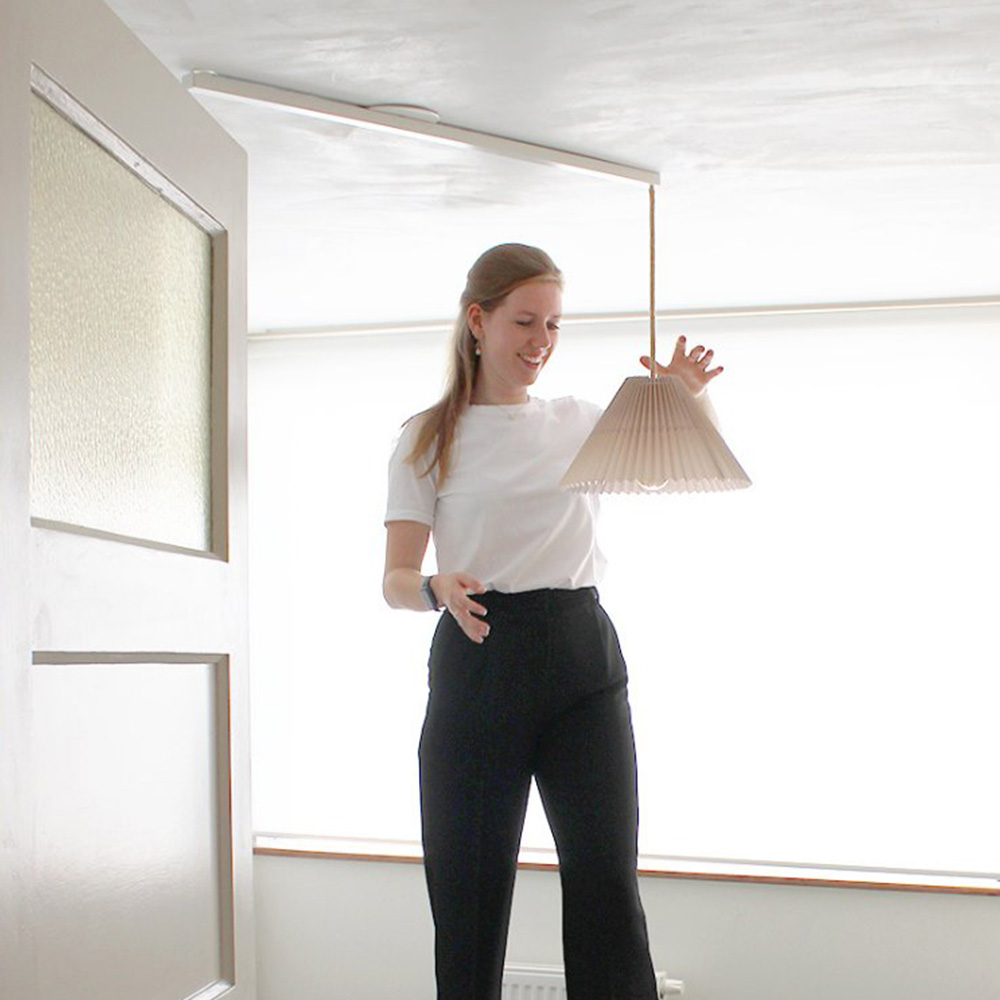

Do you want to move a lamp? With the Lightswing® you can easily slide a lamp to another place. Each Lightswing® in our collection has its own sliding range. So measure well in advance how far you want to be able to slide the pendant lights from the connection point. We have listed the sliding range per Lightswing® for you below.
You can attach a pendant light to both ends of the Lightswing® Twin. The distance between the pendant lights therefore depends on the Lightswing® length you choose. With the Lightswing® Twin 90cm, the lamps hang 90cm apart. With the Lightswing® Twin 110cm, the lamps hang 110cm apart. How far the lamps should hang from each other depends of course on the size of the dining table or kitchen worktop.
When choosing the right Lightswing® colour, it is important that the colour of the Lightswing® fits well with the colour of the ceiling or with the colour of your pendant lights. We have listed the available colours of the Lightswing® below. Curious about which colour suits your interior type? Read it in the blog about the Lightswing® colours.
So, first, decide how many lights you want to hang on the Lightswing®. Then choose the right length. And finally, decide which colour you want. Easy, right?


Ready to hang the Lightswing® at your home? Make sure you are well prepared and have the right tools at hand. We have listed everything you need below.
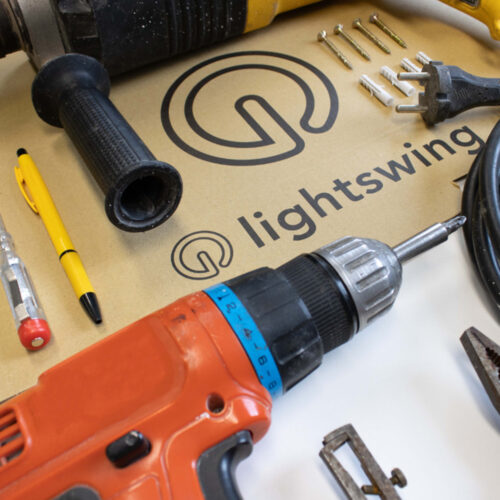

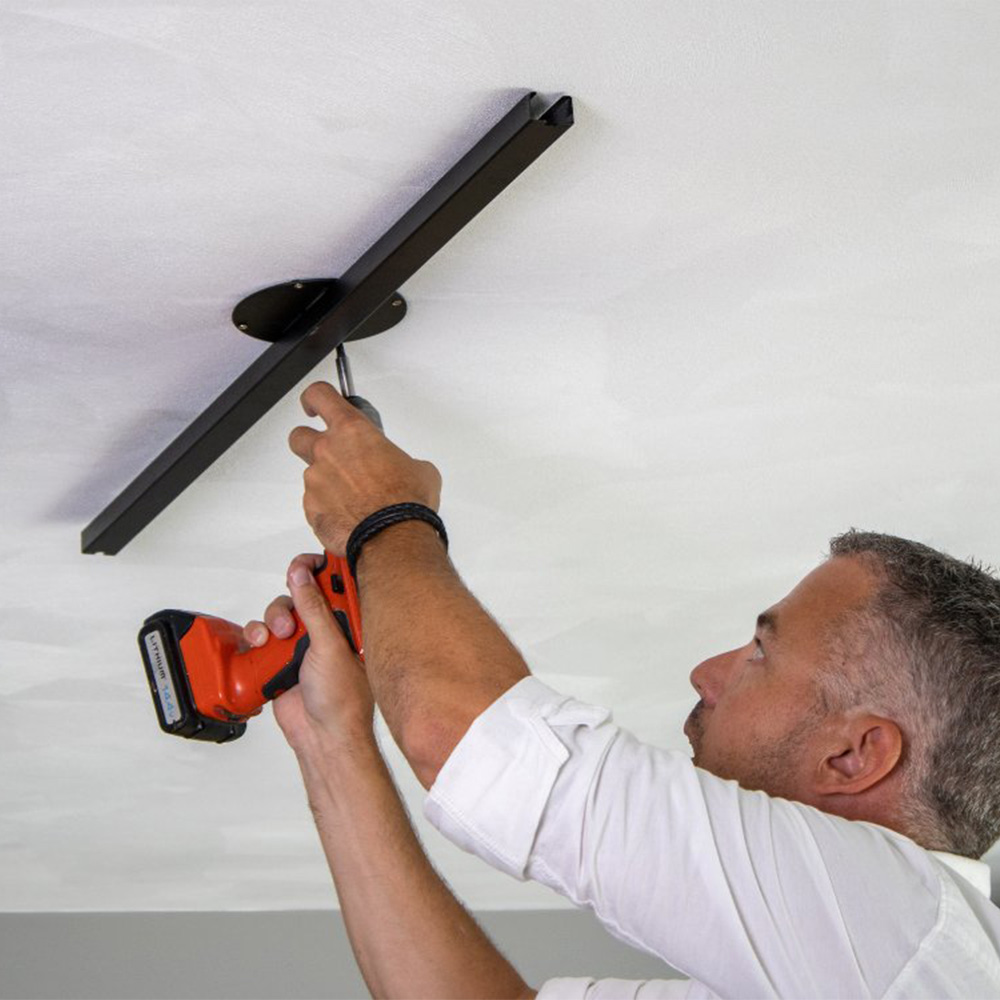

To attach the Lightswing® to your ceiling, it is useful when you already have the following tools ready:
The range of screws and plugs is enormous. When buying screws and plugs to mount the Lightswing® you should pay attention to a few things. The right choice depends first of all on your ceiling type. For a plaster ceiling you need different plugs than for a concrete ceiling so, match the right plugs well to your ceiling type.
Suitable screws for the Lightswing® must meet two things: the screw head must be flat with a maximum head width of 7mm. In addition, it is important to match the screws to the plugs you use. Take a good look at the thickness and length of the screw.
Is half the battle! Have you gone through the manual, collected the right tools and bought screws and plugs? That’s great! You’re ready to attach the Lightswing® to your ceiling!
Do you want to choose a suitable pendant light for the Lightswing®? In this blog we tell you which 3 things you should check, so that your chosen pendant light is suitable for the Lightswing®.
Lightswing® Single 90cm: max. 3.5 kg per pendant lamp
Lightswing® Twin 90cm: max. 3.5 kg per pendant lamp
Lightswing® Single 110cm: max. 2.5 kg per pendant lamp
Lightswing® Twin 110cm: max. 2.5 kg per pendant lamp
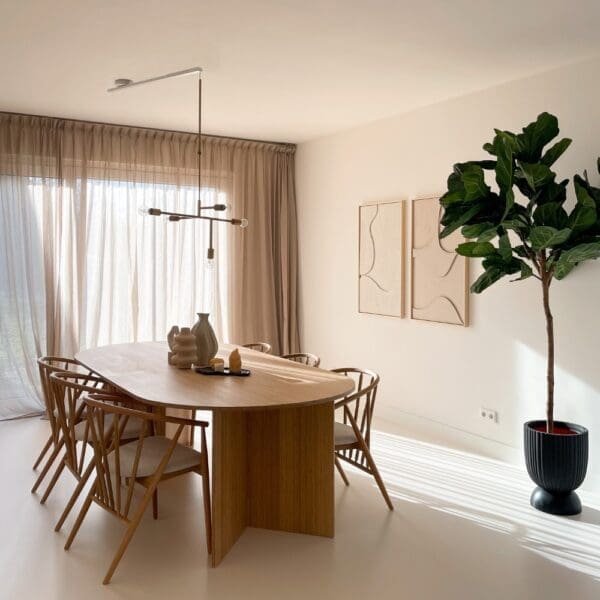

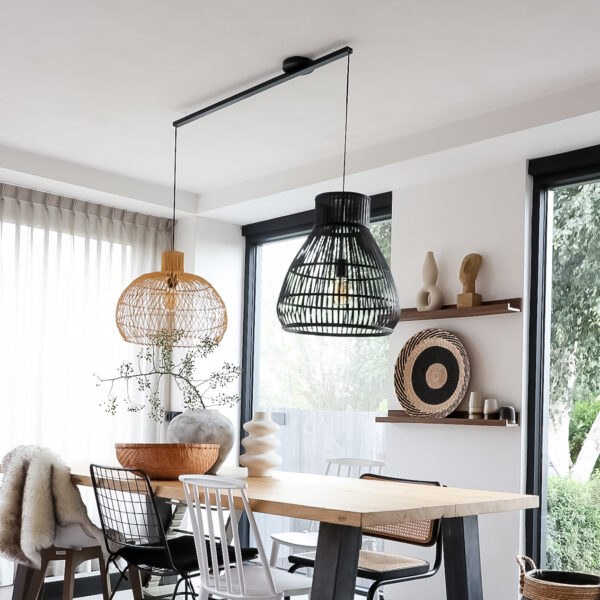

The first step is to check the weight of the pendant light. The maximum weight you can hang on the Lightswing® depends on the length of the Lightswing®. The maximum carrying weight of the Lightswing® 110cm is lower than the maximum carrying weight of the Lightswing® 90cm. This is because the distance between the attachment point and the point where the pendant lamp is larger at the 110cm.
We have the max. carrying weight per Lightswing® listed for you:
If you want to attach a lamp to the Lightswing®, it is important that this lamp only has one cord where the power wires run trough. To attach your lamp cord to the Lightswing®, you need to cut the cord a bit and attach the wires to the Quick Release. Does the lamp have an extra (decorative) cable or chain in addition to one cord? You can also attach it to the Lightswing®. Check out how to do that here!
In some cases, a pendant light has a built-in dimmer or transformer. This is often attached in the ceiling cap of the pendant light. In the Lightswing® there is no space to attach the ceiling cap and the dimmer. It is therefore not possible to attach a pendant lamp with a built-in dimmer or transformer to the Lightswing®. The Lightswing® can be used with a wall dimmer!
As you can see, the three steps are practical choices you must make. This way you know what a suitable pendant light for the Lightswing® must meet. It is up to you to choose a beautiful pendant light that fits perfectly with your interior. And at the Lightswing® of course! Order your Lightswing® here.
Are you wondering whether the ceiling in your house is suitable for the Lightswing®? In this blog we tell you per ceiling type whether or not it is suitable for attaching the Lightswing®.
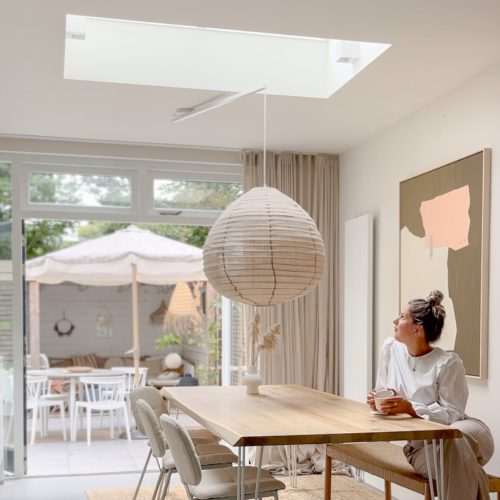

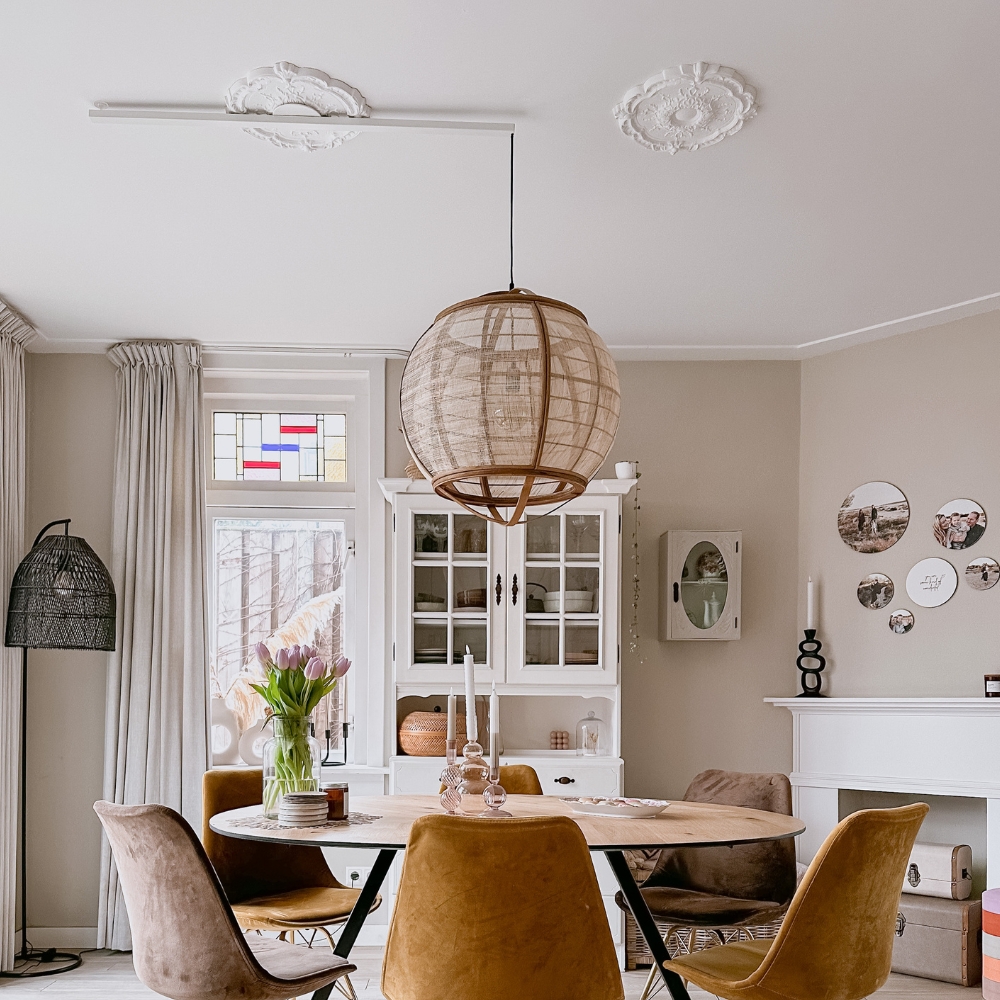

A thatched ceiling
Is there wood or plaster above the reeds? Make sure you screw the Lightswing® into the wood / plaster with the right plugs and screws. Does your thatched ceiling have no extra support (wood or plaster) under the reeds? Then it is unfortunately not possible to attach the Lightswing® to a thatched ceiling. Reed is not sturdy enough to carry the Lightswing® with the pendant lamp.
A concrete ceiling
A concrete ceiling is certainly suitable for attaching the Lightswing®. You cannot fully attach the Lightswing® to the central box, so keep in mind that you have to drill 4 holes in your concrete ceiling to be able to attach the system properly. For this we supply a handy drilling template in the Lightswing® package. So nothing can go wrong!
A wood or plaster ceiling
A wooden ceiling or a plaster ceiling is also suitable for the Lightswing®. If you have a plaster ceiling with no further support underneath (wood, for example), it is extra important to use the right plugs and screws. Make sure that the plugs go all the way through the plaster. So, the plug expands not only in the plaster, but also at the top of the drywall.
A sloping ceiling
It is possible to attach the Lightswing® to a slightly sloping ceiling. For this it is best to use a Lightswing® Twin. The Twin has an adjustable foot at both ends of the Lightswing®, so you can set the Lightswing® to the ceiling on both sides. Note: make sure that your pendant light does not hang at the lowest point. The Quick Release to which the lamp is attached is not locked in the Lightswing®. If the lamp is too heavy or the slope is too slanted, the Quick Release can come loose.
A ceiling with an ornament
It is possible to attach the Lightswing® to an ornament. With the help of the Lightswing® you can easily move the pendant lamp to the right place without loose cables hanging from the ornament. Use the mounting ring for this. This allows the Lightswing® to rotate and slide freely, without damaging the ornament.
A beamed ceiling
Do you have a beamed ceiling and do you want to attach a Lightswing®? Then there are a number of things you can consider. First of all, it is easiest when you mount the Lightswing® on the beams and not ‘between’ the beams. This gives the Lightswing® plenty of room to slide and rotate. Do you want to place the Lightswing® between the beams? Keep in mind that the Lightswing® does not have complete freedom to slide and rotate.
A skylight ceiling.
With the Lightswing® you can easily place your pendant lamp under the skylight. Connect the Lightswing® over the current light point next to the skylight. Because the system is only fixed at one point and can move freely, even if there is no ceiling above, you can easily place your pendant lamp under the skylight.
The Lightswing® is therefore suitable for almost all ceiling types. Have you already made a choice which Lightswing® you would choose? Check out the Lightswing® Single for one pendant light. Or check out the Lightswing® Twin so you can attach two pendant lights to your ceiling!
The last step of the Lightswing® assembly is to place the covers. The covers of the Lightswing ensure the best finishing touch, because they cover the screws with which the Lightswing® is attached to the ceiling. In this blog we tell you step by step how you can attach the cover plates to the Lightswing®.
1. Bring the cover plates into position. Remove the covers from each other and bring the two caps each to one side of the Lightswing®.
2. Place cover plates between the ceiling and Lightswing®. Place the two covers with the thickening between the ceiling and the Lightswing®, so that the thickening of the caps falls into the open space of the Lightswing®.
3. Slide the cover plates towards the base plate. Because the thickening of the cover plates ‘falls’ into the Lightswing®, you have enough space to slide the caps towards the base plate of the Lightswing®.
4. Make a rotating motion. When the cover plates almost slide over the base plate, you make a rotating movement. Note that the thickening is still in the gap of the Lightswing®
5. Slide and rotate. Slide and turn the cover plates further inwards, over the base plate. Do this until the covers are facing each other.
6. Press the cover plates together. The last step is clicking the two cover plates together. To do this, press the caps together until they click.
When placing the covers, it is important that the Lightswing® hangs nicely straight along the ceiling. This way you have enough space to slide the covers between the Lightswing® and the ceiling. Adjusting the Lightswing® is done with the help of the levelling foot.
Then you check whether the screws with which the Lightswing® is attached are deep enough in their holes. Do the screws stick out? Then the cover plates can be damage when turning the Lightswing®. In that case, screw the screws further into their holes or choose other screws with a smaller head size.
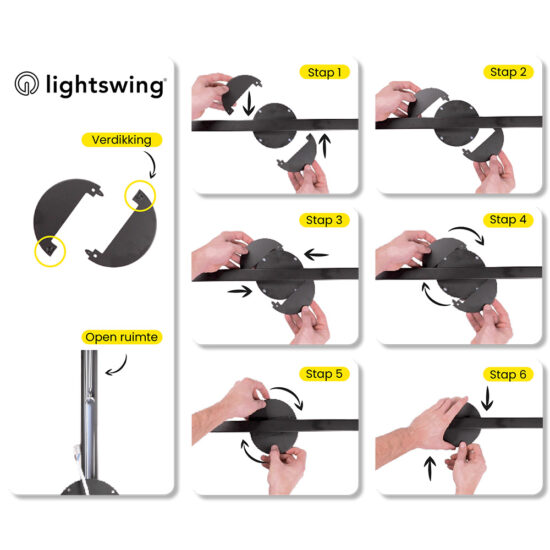

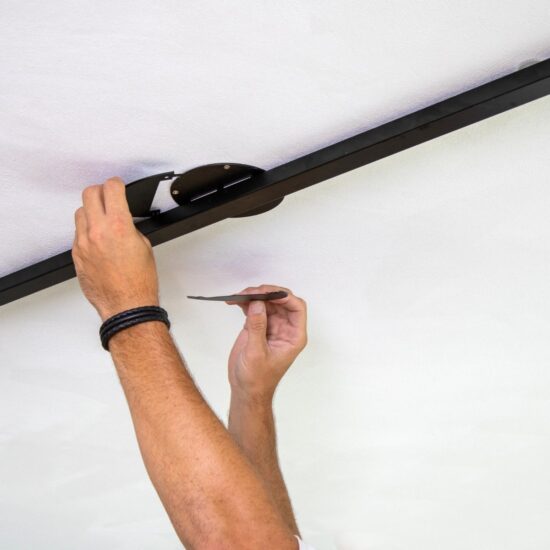

Do you often find yourself needing help to hang or adjust your pendant light? With a suspension system like the Lightswing® mounted on your ceiling, you gain complete control over your lighting without any assistance. This system revolutionizes how you interact with your pendant lights, making moving, changing, and even temporarily removing the lights a breeze.


Planning to rotate your dining table? No problem! The Lightswing® allows your pendant lamp to move in sync with your table. This advanced suspension system is not just for hanging lamps; its flexible arm means your pendant lamp isn’t restricted to one spot. Choose from models that offer up to 93 cm of movement and the ability to rotate 360 degrees, giving you the freedom to slide your lamp in any direction. This flexibility makes you less reliant on the original lighting position and expands your furniture arrangement options.
Beyond its rotation and sliding capabilities, the Lightswing® features a handy Quick Release at the end of the arm, enabling you to quickly connect or disconnect pendant lamps. This feature is ideal for those who love to refresh their space regularly or require varied lighting for different occasions. Whether you need a single lamp or dual lamp setup, the Lightswing® Twin model accommodates both effortlessly.
The Lightswing® ensures that your lighting is always where you need it to be, perfectly aligned with your dining area. Just pick the color that best fits your décor, and enjoy the right ambiance at your fingertips. 🤩
Adjusting pendant lights to align perfectly above the dining table can be a challenging and time-consuming task. Thanks to innovative suspension systems, this hassle is eliminated, allowing you to effortlessly position a pendant light exactly where you want it. This ensures that your lamps are always positioned correctly, embracing the concept of off center lighting to enhance both function and style.
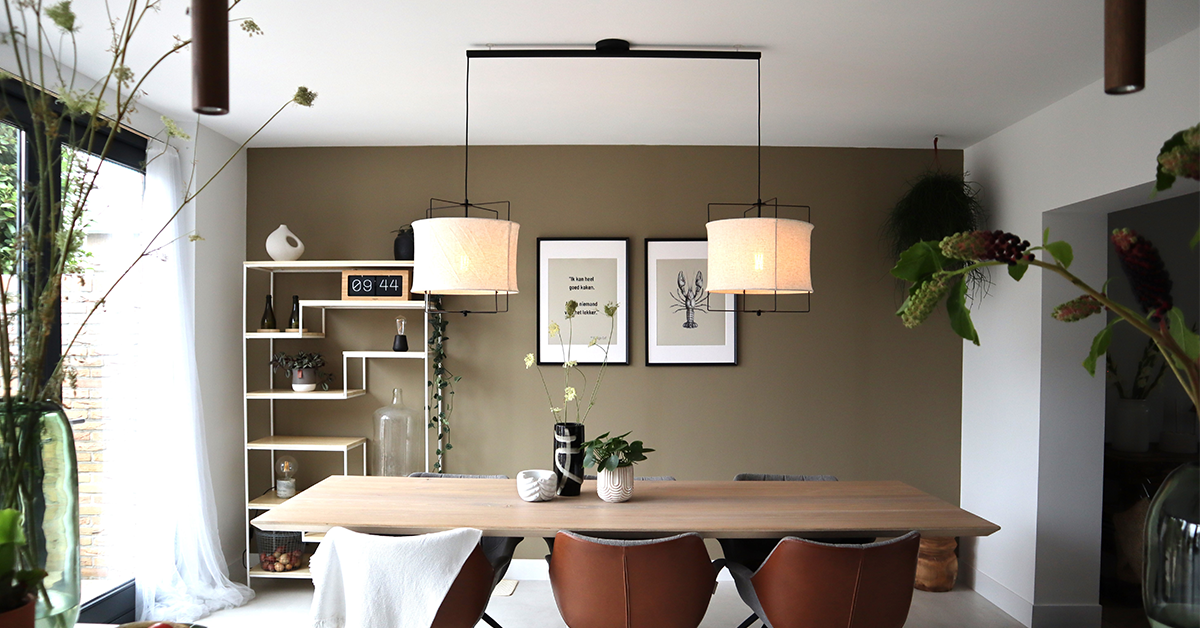

Whether you’re considering one or two pendant lights above your dining table, modern suspension systems offer unprecedented flexibility. Just as with a conventional pendant light, you just need to install the system once. From there, you can select any pendant light of your choice to attach to the movable arm, which can slide and rotate to any off-center positions you desire, all without the need to drill extra holes in the ceiling.
The Lightswing® Twin is perfect if you require two hanging lamps, offering the same easy setup and versatile adjustment capabilities. This adaptability is ideal for achieving optimal off center lighting, where you can adjust the lights’ positions according to specific needs or decorative changes.
Such suspension systems not only simplify the installation process but also enhance the functionality by making it easy to swap lamps or adjust their positions. This feature is particularly useful during events or when you need to clear the space; the lights can be repositioned or temporarily removed with minimal effort. Additionally, if you decide to rearrange the dining area, adjusting the lights is straightforward, ensuring they always illuminate the table perfectly, regardless of its position in the room.
There are numerous reasons to opt for this type of lighting setup—whether you choose the Lightswing® Single for one lamp or the Lightswing® Twin for two, you’ll enjoy both ease and versatility in your home lighting design. Explore all the possibilities of off center lighting with these innovative designs and transform how you light up your dining space.
Which Lightswing® colour do you want? Does the colour and material of the Lightswing® fit well with your interior? And more importantly; does your pendant lamp match the Lightswing®? We are happy to help you choose the right Lightswing®, so it fits in with the rest of your interior.
Do you have an industrial pendant light that you want to transform into a real eye-catcher on your ceiling? Combine them with the matt black Lightswing®! The Lightswing® matt black 9005 is industrial, graphic and a frequently seen colour in the house. The wonderful thing about this matted Lightswing® is that it really holds the attention. By matching the colour of the cord and the suspension system, the Lightswing® becomes a design item in your interior.
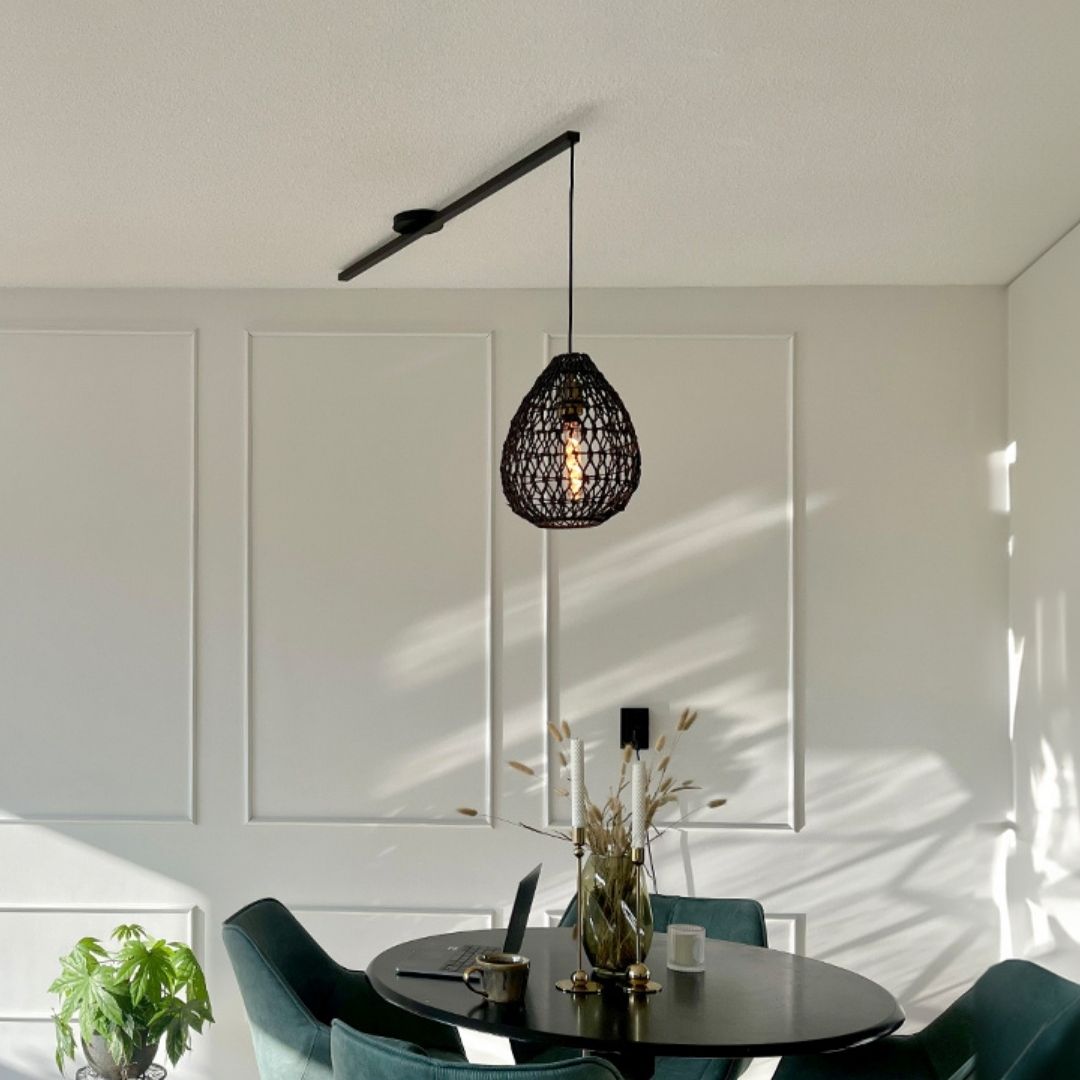

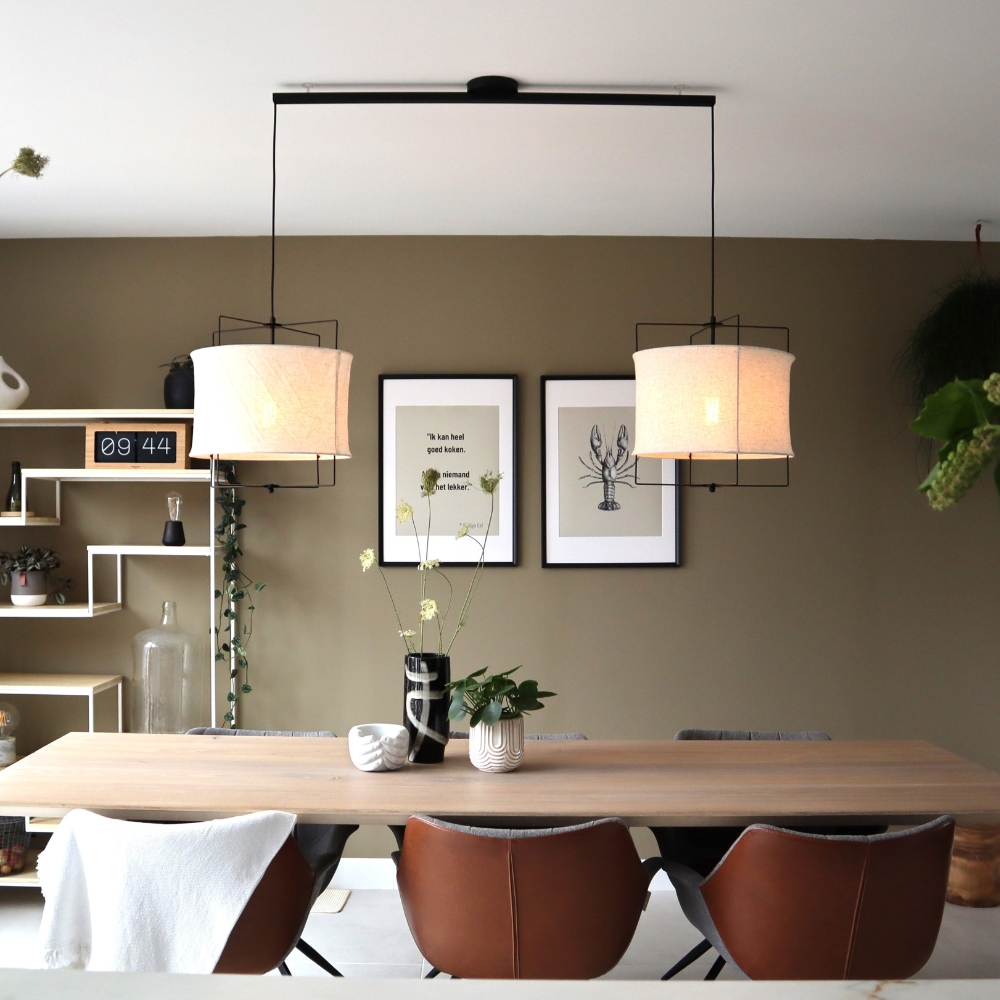

A Lightswing® in stainless steel combines well with wood and concrete. Are those materials featured in your interior? Then the Lightswing® stainless steel is a great option for you. Stainless steel elements can often be seen in the kitchen, in chair or table legs or in a lamp fitting. The stainless steel Lightswing® is a stylish addition to these elements. Also, stainless steel gives your interior a timeless and modern look. Just attach a wooden lamp to the Lightswing® and you are done!
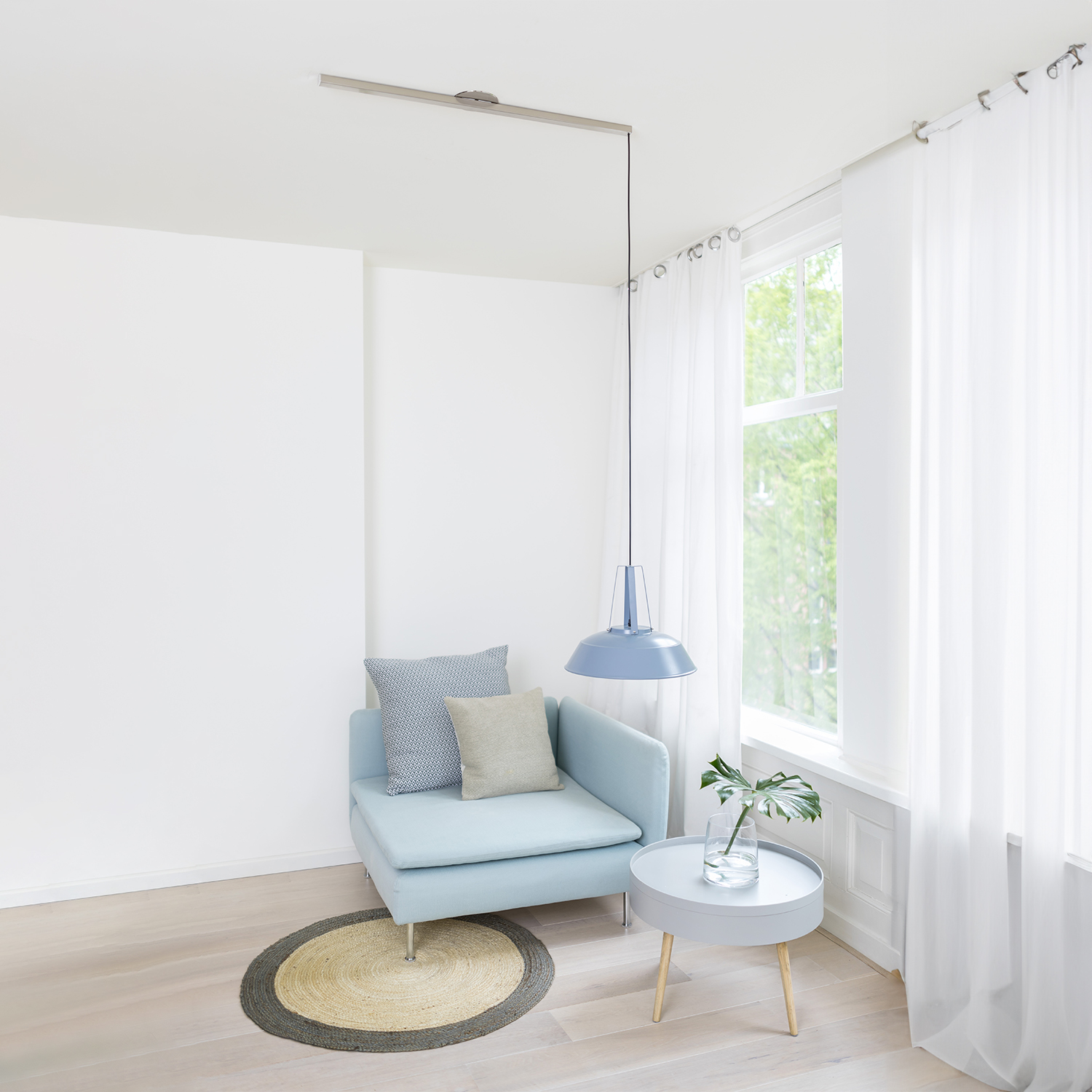

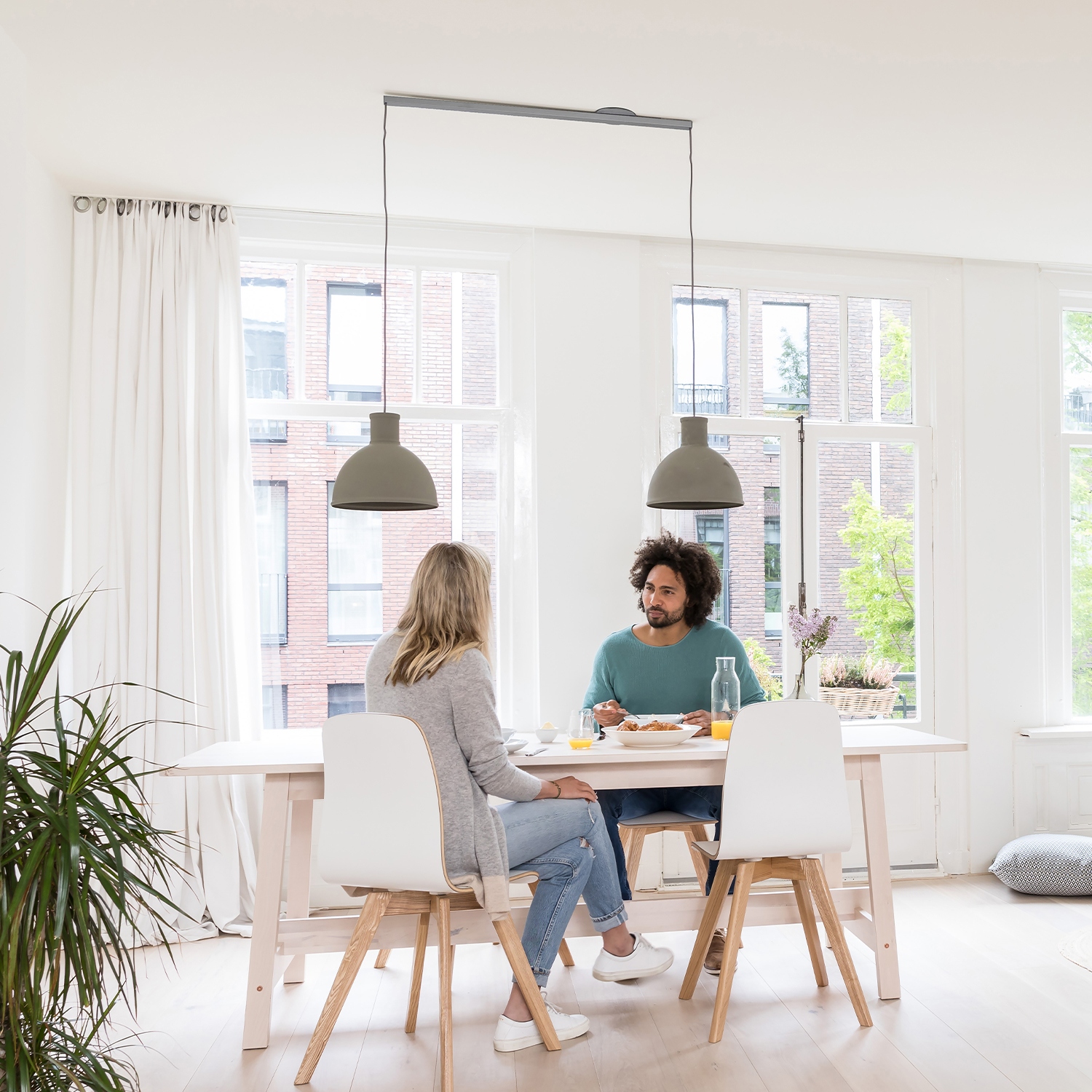

When matching your matt white Lightswing®, it is important to first look at the colour of your ceiling. Chances are that the Lightswing® matt white RAL9016 blends perfectly with your ceiling colour. The colour of the lamp cord of the pendant lamp also has an important role.
The Lightswing® is at its best when it matches to your pendant lights. It also gives your interior a fresh look. So do you have lamps with a light lamp cord? Go for the matt white Lightswing®!
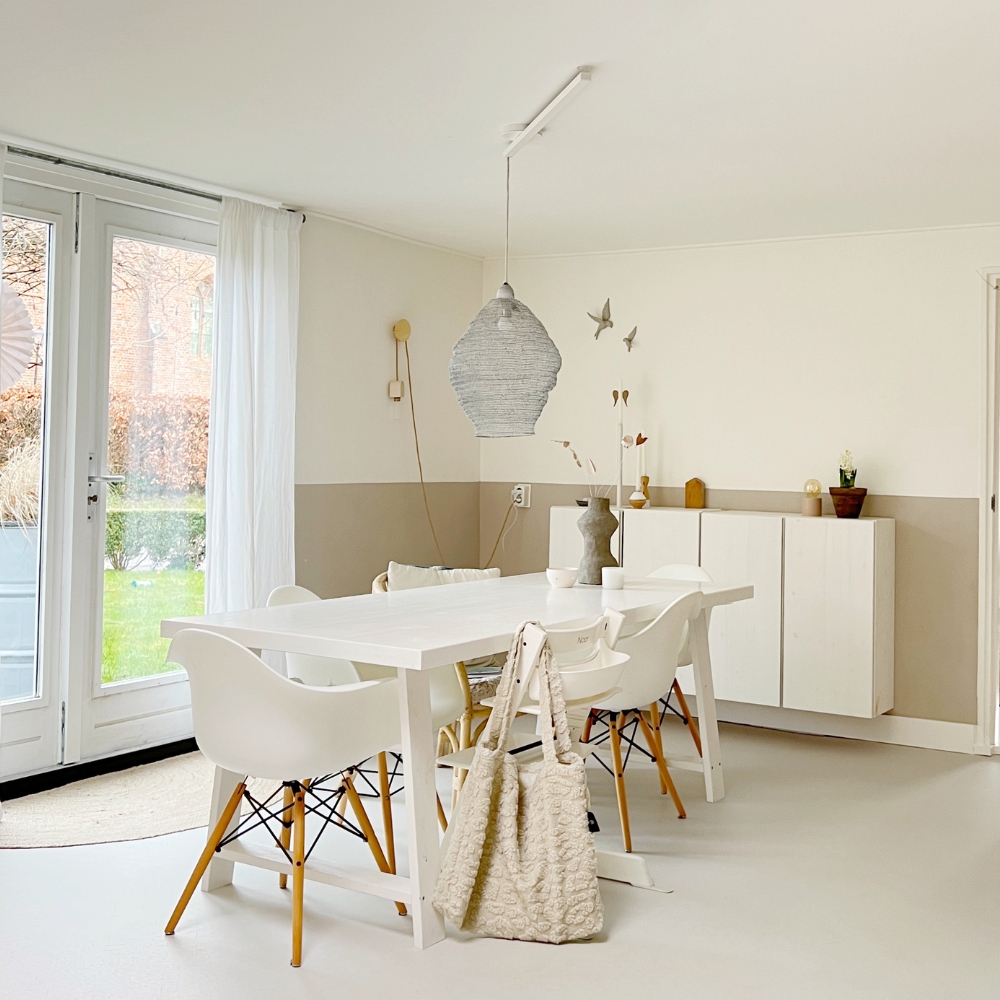



So, do you already know which Lightswing® colour you want? Take a good look at all the colours or get inspired and look inside different interiors where a Lightswing® hangs. Get inspired at our ‘look inside at’ page.